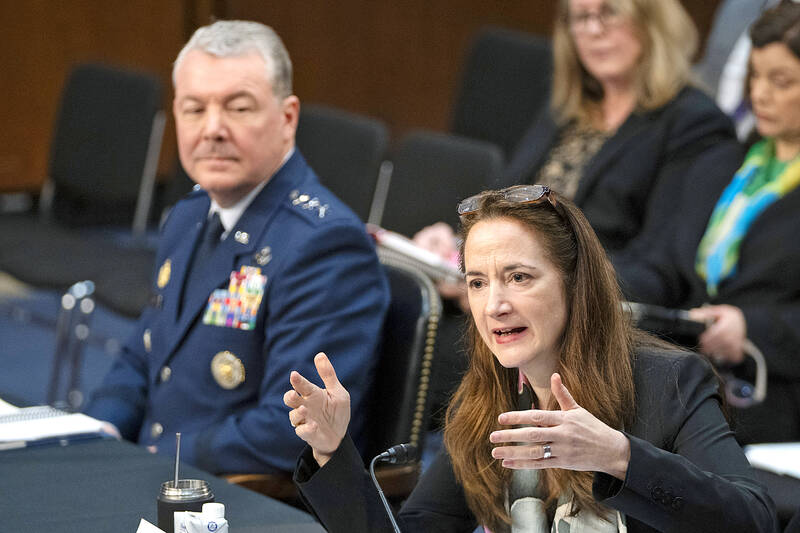Beijing and Moscow could cooperate in a conflict over Taiwan, the top US intelligence chief told the US Senate this week.
“We see China and Russia, for the first time, exercising together in relation to Taiwan and recognizing that this is a place where China definitely wants Russia to be working with them, and we see no reason why they wouldn’t,” US Director of National Intelligence Avril Haines told a US Senate Committee on Armed Services hearing on Thursday.
US Senator Mike Rounds asked Haines about such a potential scenario. He also asked US Defense Intelligence Agency Director Lieutenant General Jeffrey Kruse about the Pentagon’s planning for such a possibility.

Photo: AP
The US Department of Defense has “become even more concerned about our joint force requirements in an environment where” Russia and China “would certainly be cooperative, and we need to take that into account,” Kruse said.
“Even if Russia’s and China’s military forces are not interoperable, they would certainly be cooperative, and we would need to take that into account for structure and planning,” he said.
Rounds said that “the bottom line is that, basically, if we were to have a conflict with one, chances are that we would have a second front,” affecting planning, equipment and personnel needs.
“Certainly it’s a possibility,” Haines said. “The question of just how likely it is, I think differs depending on the scenario.”
Haines said that increasing cooperation and the “no-limits partnership” between China and Russia across every sector of society, from politics and the economy, to military and technology, “is something that our understanding is prompting new planning across the government in many respects.”
“We expect the PLA [Chinese People’s Liberation Army] will field more advanced platforms, deploy new technologies, grow more competent in joint operations, and seek to strengthen their nuclear forces and cybercapabilities, while also seeking to divide us from our allies in Europe and in the Indo-Pacific,” she said.
Chinese President Xi Jinping (習近平) “and his senior leadership expect some degree of future instability in the bilateral relationship with the United States, and they continue to believe that the United States is committed to containing China’s rise and undermining the party’s rule,” she said.
Haines said that to achieve such ambitions, “Beijing will continue to use its military forces to intimidate its neighbors and to shape the region’s actions in accordance with the PRC [People’s Republic of China] priorities, most obviously, in relation to Taiwan, as the PRC presses for unification.”
However, Beijing also perceives value in projecting stability in its relationship with the US, “particularly from a domestic economic perspective, which is their main priority,” she said.

WAITING GAME: The US has so far only offered a ‘best rate tariff,’ which officials assume is about 15 percent, the same as Japan, a person familiar with the matter said Taiwan and the US have completed “technical consultations” regarding tariffs and a finalized rate is expected to be released soon, Executive Yuan spokeswoman Michelle Lee (李慧芝) told a news conference yesterday, as a 90-day pause on US President Donald Trump’s “reciprocal” tariffs is set to expire today. The two countries have reached a “certain degree of consensus” on issues such as tariffs, nontariff trade barriers, trade facilitation, supply chain resilience and economic security, Lee said. They also discussed opportunities for cooperation, investment and procurement, she said. A joint statement is still being negotiated and would be released once the US government has made

Authorities have detained three former Taiwan Semiconductor Manufacturing Co (TMSC, 台積電) employees on suspicion of compromising classified technology used in making 2-nanometer chips, the Taiwan High Prosecutors’ Office said yesterday. Prosecutors are holding a former TSMC engineer surnamed Chen (陳) and two recently sacked TSMC engineers, including one person surnamed Wu (吳) in detention with restricted communication, following an investigation launched on July 25, a statement said. The announcement came a day after Nikkei Asia reported on the technology theft in an exclusive story, saying TSMC had fired two workers for contravening data rules on advanced chipmaking technology. Two-nanometer wafers are the most

NEW GEAR: On top of the new Tien Kung IV air defense missiles, the military is expected to place orders for a new combat vehicle next year for delivery in 2028 Mass production of Tien Kung IV (Sky Bow IV) missiles is expected to start next year, with plans to order 122 pods, the Ministry of National Defense’s (MND) latest list of regulated military material showed. The document said that the armed forces would obtain 46 pods of the air defense missiles next year and 76 pods the year after that. The Tien Kung IV is designed to intercept cruise missiles and ballistic missiles to an altitude of 70km, compared with the 60km maximum altitude achieved by the Missile Segment Enhancement variant of PAC-3 systems. A defense source said yesterday that the number of

Taiwanese exports to the US are to be subject to a 20 percent tariff starting on Thursday next week, according to an executive order signed by US President Donald Trump yesterday. The 20 percent levy was the same as the tariffs imposed on Vietnam, Sri Lanka and Bangladesh by Trump. It was higher than the tariffs imposed on Japan, South Korea and the EU (15 percent), as well as those on the Philippines (19 percent). A Taiwan official with knowledge of the matter said it is a "phased" tariff rate, and negotiations would continue. "Once negotiations conclude, Taiwan will obtain a better